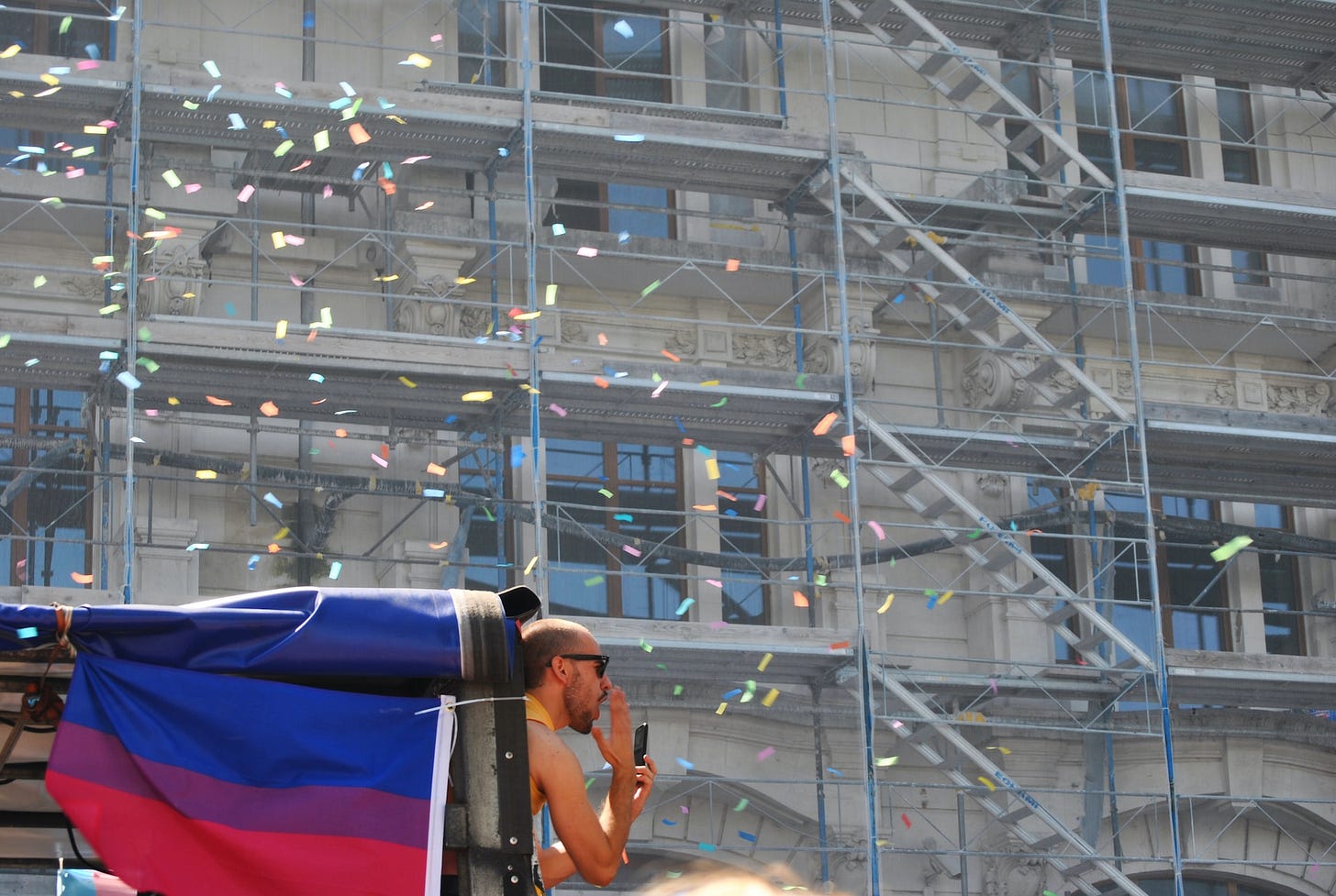supporting bisexual Christians
this #BiWeek, celebrate the bi+ folks in your life and in your Church

Happy Bisexual Awareness Week! Each year, #BiWeek runs from September 16 to 23, which is Celebrate Bisexuality+ Day.1 Bi+ is an inclusive term which groups together people who identify as bisexual, pansexual, queer, fluid, or otherwise non-monosexual.2
The most common definition of bisexuality comes from bisexual activist and author Robyn Ochs: “I call myself bisexual because I acknowledge that I have in myself the potential to be attracted – romantically and/or sexually – to people of more than one gender, not necessarily at the same time, not necessarily in the same way, and not necessarily to the same degree.”3
Unfortunately, bisexual people suffer disproportionately from mental health challenges in comparison to monosexuals (exclusively straight, lesbian, or gay folks).4 Bisexuals report elevated rates of depression, which research suggests may be connected to cultural stigma against bisexuality.5
In contrast to increasing acceptance of lesbian and gay Americans, negative public opinion of bisexuals in the United States is prevalent. This phenomenon, called bi-negativity and/or biphobia, has a damaging effect on the mental health of bisexual Americans.6
Bisexual erasure—the lack of representation and relative invisibility of bisexuals across the cultural landscape—also likely plays a role in the mental health challenges that bi+ people face.7
Because some bisexual people report feeling misunderstood and judged by mental healthcare providers and hesitant about seeking assistance, social and spiritual communities may need to provide additional care to help bisexuals navigate mental health challenges.8
In her work at the intersections of bisexuality, Christianity, and depression, researcher Carol A. Shepard concludes that “it was practically impossible in my empirical research to separate psychological distress from the experience of being bisexual and Christian.”9
In 2016, Shepard engaged in interviews with 54 Christians from the U.S. and the U.K. Shepard found that “86% of UK and 100% of US participants revealed a depressive condition of varying intensity in this study”.10
Furthermore, 42% of U.S. and 43% of U.K. participants felt that the difficulties of navigating Christianity and bi+ identity contributed to their depressive symptoms.11 These findings are deeply disturbing and, in my opinion, implicate Christian communities in the perpetuation of harm against bisexuals and bi+ Christians.
Through additional interviews with clergy, Shepard points to factors that exacerbate bi-negativity in Christian churches, including assumptions that bisexual people are promiscuous, the Church’s overall uneasiness regarding sexuality, and lack of pastoral training or resources around bisexuality.12
American and other western Christian churches have a long way to go in becoming inclusive of all 2SLGBTQIA+ people as well as people experiencing mental health challenges. Christians should familiarize themselves with the statistics surrounding sexual minorities and depression, including the disproportionate toll depression takes on bi+ people.13
A person’s bisexuality informs their ability able to see the world and the divine through multiple lens, which is a huge theological asset. The theological perspectives of bi+ Christians and other bi+ people of faith offer could positively impact their faith communities, if only they were allowed to be their full selves.
It takes a lot of resilience to constantly face so much stigma and discrimination from both the popular culture and your faith community. Bi+ Christians should be celebrated for their dedication to their faith—whether they remain in church or seek spiritual connection elsewhere.
Take a moment this week to consider how you can better support the bisexuals in your life and in your Church, including the bi+ folks who may not yet be out to you. How can you combat bi-negativity and stand in solidarity with bisexual Christians?
—
If this post resonated with you, consider hitting the like button (the heart) below or sharing this post with a friend.
Author’s note: This post was drafted on the unceded and traditional territories of the xʷməθkʷəy̓əm (Musqueam), Sḵwx̱wú7mesh (Squamish), and səlilwətaɬ (Tsleil-Waututh) First Nations. I published this post on Meusebach-Comanche Treaty land. I am grateful to live, work, and study on the traditional territories of the Nʉmʉnʉʉ Sookobitʉ (Comanche), Tonkawa, Jumanos, and Ndé Kónitsąąíí Gokíyaa (Lipan Apache) peoples.
D. Joye Swan and Shani Habibi, Bisexuality: Theories, Research, and Recommendations for the Invisible Sexuality (Cham, Switzerland: Springer International Publishing, 2018), 6, https://doi.org/10.1007/978-3-319-71535-3.
Meg John Barker, “Depression and/or Oppression? Bisexuality and Mental Health,” Journal of Bisexuality 15, no. 3 (July 2015): 369. https://doi.org/10.1080/15299716.2014.995853
Swan and Habibi, Bisexuality, 167; Andrew Kam-Tuck Yip and Alex Toft, Bisexuality, Religion and Spirituality: Critical Perspectives (London: Routledge, 2020), 170, https://doi.org/10.4324/9780429019913.
Swan and Habibi, Bisexuality, 96.
Swan and Habibi, Bisexuality, 77.
Swan and Habibi, Bisexuality, 166.
Yip and Toft, Bisexuality, Religion and Spirituality, 158.
Yip and Toft, Bisexuality, Religion and Spirituality, 170.
Yip and Toft, Bisexuality, Religion and Spirituality, 162.
Yip and Toft, Bisexuality, Religion and Spirituality, 165-169.
Swan and Habibi, Bisexuality, 167.




Marshall, thank you for focusing on this issue. Christians should work on loving all people as God loves them.
🔥